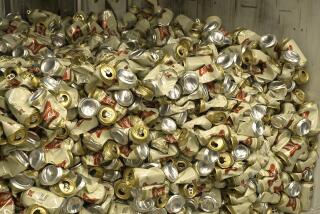Regional Food Protected
- Share via
World Trade Organization judges said the European Union should change rules protecting regional food and drink names and allowed Anheuser-Busch Cos. to continue using the Budweiser trademark it shares with a Czech rival.
WTO arbitrators said the EU’s “geographical indications,” which apply to almost 700 products including Kalamata olives, Welsh lamb and Breton cider, can keep protection that limits traditional names to their original regions as long as the bloc allows foreign food producers to register regional names such as Idaho potatoes or Florida oranges in the EU.
“For years, Europe effectively had a ‘Do Not Apply’ sign directed at foreign producers,” acting U.S. Trade Representative Peter Allgeier said. “Under WTO rules, U.S. ... food producers should have the same access to protection for ‘geographical indications’ as European food producers.”
The decision, however, will have little effect on California’s $30-billion farm industry, experts said.
“It’s not as important for the raw crops like almonds that come out of California,” said Julie Adams, a trade expert at the Almond Board of California. Growers ship about two-thirds of the state’s 1-billion-pound almond crop overseas, making the nut California’s biggest exported agricultural commodity.
Citrus fruit, another big export crop, typically is sent abroad under the label of the giant Sunkist growers cooperative. The Sunkist brand is generally seen as a better marketing tool than California or Arizona monikers representing the geographic origins of the crop.
California wine, a large export product in which geographic names such as Napa or Alexander Valley are important, has its own rules largely unaffected by the WTO decision.
After Tuesday’s ruling, both sides claimed victory. The U.S. said that the ruling showed that existing trademarks trump the EU’s naming system. The EU said the decision by the Geneva-based WTO panel showed its protections were compatible with trademark law, subject to minor changes.
The ruling’s implications hinge on the right to translations of a registered product. Under the EU rules, manufacturers can register the product in one language with one national authority and challenge any use of a translation of that name in another EU member nation.
The EU can’t apply the translation rule to challenge trademarks when there’s a risk of confusion, the WTO ruled.
That means the Budweiser or “Bud” beer names, registered as trademarks in 20 of the EU’s 25 nations, can’t be challenged by Budejovicky Budvar, a Czech brewer that claims the name is a German translation of Budejovicky, Anheuser-Busch said.
Times staff writer Jerry Hirsch contributed to this report.
More to Read
Inside the business of entertainment
The Wide Shot brings you news, analysis and insights on everything from streaming wars to production — and what it all means for the future.
You may occasionally receive promotional content from the Los Angeles Times.










